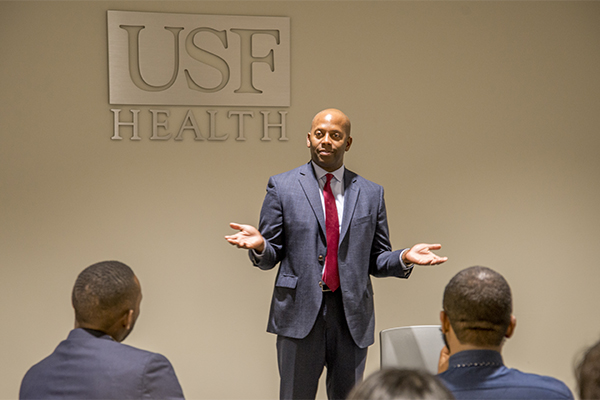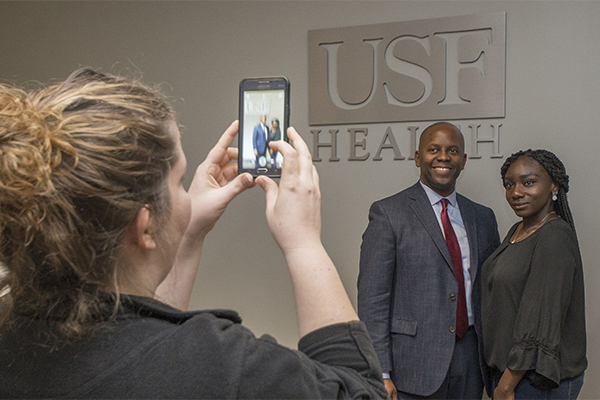Students from across the university attended the latest Diversity Lectures Series titled Reflection at the Intersection of Race and Medicine. The University of South Florida’s Office of Diversity, Inclusion and Equal Opportunity and the Morsani College of Medicine’s Office of Diversity and Enrichment hosted Dallas trauma surgeon Brian H. Williams, MD, FACS, a 2001 graduate of the Morsani College of Medicine and associate professor of surgery at University of Texas Southwestern Medical Center, who spoke here Feb. 15 about race relations and how they have impacted his life.
Dr. Williams addressed two groups, both primarily medical professionals and USF Health students. He cited emotional examples throughout his life of how race relations have shaped the person he’s become starting from his childhood, through his adult life, and his most recent experience in the wake of the July 7, 2016 Dallas police shooting.

Brian H. Williams, MD, FACS, a 2001 graduate of the Morsani College of Medicine and associate professor of surgery at University of Texas Southwestern Medical Center, addresses a group students at the WELL.
“The shooting has been a rather transformative event in my life. I felt like the one thing that was not being discussed was social implications of what led us to a point where it was normal for black men to be dying and for it to be normal to turn around and shoot police officers,” said Dr. Williams, who was the trauma surgeon at Parkland Memorial Hospital where seven of the 12 wounded Dallas police officers were treated. “The main point I want the students to take away from my experience is that you cannot remain silent. Without good people speaking up to take a stance, they will continue to occur unabated.”
Dr. Williams never expected the events of what happened that evening would intersect with his personal and professional life. The chaos in the trauma center forced security to implement a code yellow, locking down the hospital. Dr. Williams and his team operated on three of the five officers who didn’t survive. He said his memories of cries from the families still haunt him. The events of that night, the chaos in the trauma center and his own race-related experiences drove him to tears that evening.

Dr. Williams poses for a photo with College of Public Health student Raaven Goffe.
His professionalism and dedication to patient care are why he and his team worked feverishly on the wounded police officer. They did not think about the race or occupation of the victims as they did all they could to save them. “In times of medical crisis, none of that matters,” he said.
Dr. Williams never planned to make the remarks he made during the July 11 nationally-televised press conference, but he felt that no one was talking about the “elephant in the room,” as he described it. He spoke candidly about how he felt about police brutality, racism, escalating violence, and talked about his own experiences with racism. He described the remarks he made as a huge weight lifted off his shoulders.
He ended his session addressing the groups about what their role is in society and how people view medical professionals.
“As health care professionals, you all have power you may not realize. People revere you for what you do. Your words and actions can transform humanity. You can make a difference in medical school, at this university and in society,” he said to a group of primarily medical professionals and USF Health students. “There’s a price you pay for being silent and there’s a price for speaking up. My silence ended July 11. When will yours end?”
Raaven Goffe, who attended both of Dr. Williams’ presentations, appreciated how candidly he spoke about his experiences and how they changed his life. She described him as a brave man who had the courage to speak up.
“I was awe struck by how he was able to put together a coherent response that was able to get people to pay attention to an issue,” said the second-year College of Public Health student. “He would have my vote if he were a politician. As a medical doctor, he has my trust as a practitioner. He fights for his patients just like he fights for his community.”
Story, video and photos by Freddie Coleman
